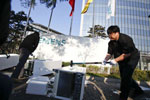Regional peace depends on mutual trust
Updated: 2011-11-15 16:10
By Fu Mengzi (chinadaily.com.cn)
|
|||||||||||
As one of the most energetic regions in the world, Asia Pacific faces traditional as well as non-traditional challenges in fields such as economic cooperation, natural disasters, climate change, environmental protection, nuclear proliferation and cross-border crimes. But for the region as a whole, the most urgent challenge is the divergence of economic development and security concerns.
The increasing economic interdependence of the region's countries has done little to promote mutual trust between the regional powers and smaller countries, which are running in different orbits. There are three main reasons for that.
First is the divergence of cooperation and competition between China and the United States. The two countries may be economically interdependent to an unprecedented extent, but they lack even the most basic mutual trust on strategy and security. The two sides had a chance to improve relations in 2009, when they signed a joint declaration during US President Barack Obama's visit to China. Soon, however, that chance was lost because of a dozen or so incidents such as the US arms sale to Taiwan, Google's withdrawal and Obama's meeting with the Dalai Lama.
The US has been worrying that as an emerging power China could challenge its hegemony, while Beijing is worried that Washington might contain it strategically. That has compelled the two countries to keep a close watch on each other, distracting them from the importance that their interdependence carries.
Second, there are too many territorial disputes among the powers in the Asia-Pacific region that have the potential to turn into conflicts. Japan-Russia, Japan-ROK (Republic of Korea), China-Japan, China-India, India-Pakistan and the disputes in the South China Sea — powder kegs can be found in almost every part of the region, with the most dangerous being the Korean Peninsula issue.
The Six-Party Talks, or the most important mechanism for restoring lasting peace on the Korean Peninsula as well as the region, have not yet been resumed. True, China (and the US) wants the talks to be resumed. But the US and the Republic of Korea don't believe that the Democratic People's Republic of Korea (DPRK) is sincere about abandoning its nuclear plan altogether. Also, the ROK insists that the DPRK apologize before the talks could be resumed.
Many problems have to be solved before the Six-Party Talks could resume. The US and the DPRK, however, have resumed direct contacts — they held talks in Geneva recently — and Seoul has said it would resume humanitarian aid to Pyongyang, raising hopes that things could improve in the near future.
The third reason for the lack of trust among the region's countries is that Asia Pacific doesn't have a dominating mechanism to boost security cooperation and mutual trust. Many complex dialogues are held in the region regularly, and they have necessary and different functions. But they are inefficient and become redundant in no time. In Southeast Asia alone, for instance, hundreds of security meetings are held every year, but the Cold War mentality still exists in the region and plays a big role in lowering the level of mutual trust.
The Cold War mentality is influencing the dynamics in the Asia Pacific. There is no sense in building a security order or trying to cope with non-traditional challenges, given the underlying suspicion among the region's countries. For example, after the devastating earthquake in Japan in March, China sent only a small team of 15 people. This shows much work is needed to promote mutual trust among the region's countries.
But despite their lack of strategic mutual trust and disagreements, China and the US are trying to achieve a breakthrough in building mutual trust to avoid harmful competition.
But such a trust-building approach entails conflicts and uncertainty, and has to endure a long breaking-in period. But China has stuck (and will stick) to the path of peaceful development and is determined to defend regional security. But its pursuit of peaceful development alone cannot guarantee peace because of the existing frictions and any uncertain factors that may come along.
History shows that interdependence among countries can hold them from going to war with each other, and closer economic ties can help them protect their security interests and prevent their mutual hostility from rising.
What's more, Asia Pacific countries have no intention to side either with China or the US, although some are trying to strike a regional balance. China, for its part, has established strategic relations with the major regional powers, most of which don't see China's rise as a threat.
No wonder, despite the strong military ties between the Philippines and the US, former Philippines President Fidel V. Ramos has suggested that the focus of Sino-Philippine relations be extended from the South China Sea conflict to the more important area of economic growth, and that Manila be cautious against being stuck between Beijing and Washington.
After the global financial crisis, structural changes have occurred in the world's balance of power, with emerging countries growing stronger and China becoming the world's second largest economy. But China's rise has exacerbated the US' anxiety, shifting Sino-US relations toward a new historical period involving cooperation and conflict both, and that will decide whether Asia Pacific's future will be one of peace or confrontations.
The author is assistant president and research professor at the China Institute of Contemporary International Relations. The view expressed here do not necessarily reflect those of the China Daily website.




